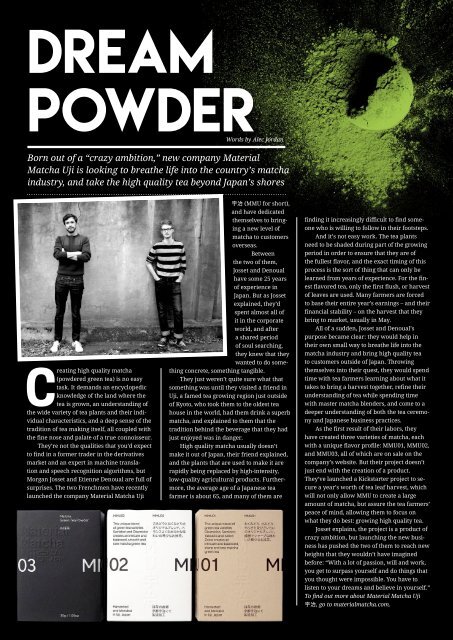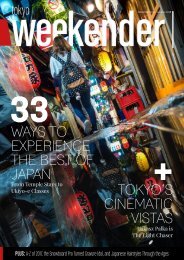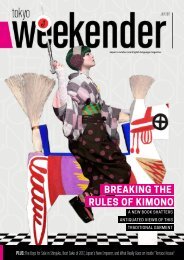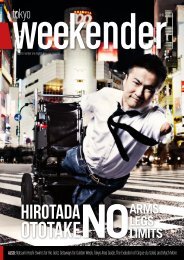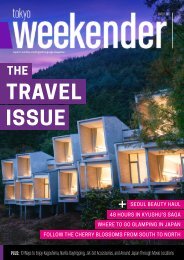Tokyo Weekender - October 2017
A day in the life of a geisha. Find your perfect Kyushu. Plus Q&A with anime director Keiichi Hara, are robots taking our jobs?, Explore Japanese cuisine at GINZA SIX, and Tsukuda guide
A day in the life of a geisha. Find your perfect Kyushu. Plus Q&A with anime director Keiichi Hara, are robots taking our jobs?, Explore Japanese cuisine at GINZA SIX, and Tsukuda guide
You also want an ePaper? Increase the reach of your titles
YUMPU automatically turns print PDFs into web optimized ePapers that Google loves.
Dream<br />
Powder<br />
Words by Alec Jordan<br />
Born out of a “crazy ambition,” new company Material<br />
Matcha Uji is looking to breathe life into the country’s matcha<br />
industry, and take the high quality tea beyond Japan’s shores<br />
Creating high quality matcha<br />
(powdered green tea) is no easy<br />
task. It demands an encyclopedic<br />
knowledge of the land where the<br />
tea is grown, an understanding of<br />
the wide variety of tea plants and their individual<br />
characteristics, and a deep sense of the<br />
tradition of tea making itself, all coupled with<br />
the fine nose and palate of a true connoisseur.<br />
They’re not the qualities that you’d expect<br />
to find in a former trader in the derivatives<br />
market and an expert in machine translation<br />
and speech recognition algorithms, but<br />
Morgan Josset and Etienne Denoual are full of<br />
surprises. The two Frenchmen have recently<br />
launched the company Material Matcha Uji<br />
宇 治 (MMU for short),<br />
and have dedicated<br />
themselves to bringing<br />
a new level of<br />
matcha to customers<br />
overseas.<br />
Between<br />
the two of them,<br />
Josset and Denoual<br />
have some 25 years<br />
of experience in<br />
Japan. But as Josset<br />
explained, they’d<br />
spent almost all of<br />
it in the corporate<br />
world, and after<br />
a shared period<br />
of soul searching,<br />
they knew that they<br />
wanted to do something<br />
concrete, something tangible.<br />
They just weren’t quite sure what that<br />
something was until they visited a friend in<br />
Uji, a famed tea growing region just outside<br />
of Kyoto, who took them to the oldest tea<br />
house in the world, had them drink a superb<br />
matcha, and explained to them that the<br />
tradition behind the beverage that they had<br />
just enjoyed was in danger.<br />
High quality matcha usually doesn’t<br />
make it out of Japan, their friend explained,<br />
and the plants that are used to make it are<br />
rapidly being replaced by high-intensity,<br />
low-quality agricultural products. Furthermore,<br />
the average age of a Japanese tea<br />
farmer is about 65, and many of them are<br />
finding it increasingly difficult to find someone<br />
who is willing to follow in their footsteps.<br />
And it’s not easy work. The tea plants<br />
need to be shaded during part of the growing<br />
period in order to ensure that they are of<br />
the fullest flavor, and the exact timing of this<br />
process is the sort of thing that can only be<br />
learned from years of experience. For the finest<br />
flavored tea, only the first flush, or harvest<br />
of leaves are used. Many farmers are forced<br />
to base their entire year’s earnings – and their<br />
financial stability – on the harvest that they<br />
bring to market, usually in May.<br />
All of a sudden, Josset and Denoual’s<br />
purpose became clear: they would help in<br />
their own small way to breathe life into the<br />
matcha industry and bring high quality tea<br />
to customers outside of Japan. Throwing<br />
themselves into their quest, they would spend<br />
time with tea farmers learning about what it<br />
takes to bring a harvest together, refine their<br />
understanding of tea while spending time<br />
with master matcha blenders, and come to a<br />
deeper understanding of both the tea ceremony<br />
and Japanese business practices.<br />
As the first result of their labors, they<br />
have created three varieties of matcha, each<br />
with a unique flavor profile: MMU01, MMU02,<br />
and MMU03, all of which are on sale on the<br />
company’s website. But their project doesn’t<br />
just end with the creation of a product.<br />
They’ve launched a Kickstarter project to secure<br />
a year’s worth of tea leaf harvest, which<br />
will not only allow MMU to create a large<br />
amount of matcha, but assure the tea farmers’<br />
peace of mind, allowing them to focus on<br />
what they do best: growing high quality tea.<br />
Josset explains, the project is a product of<br />
crazy ambition, but launching the new business<br />
has pushed the two of them to reach new<br />
heights that they wouldn’t have imagined<br />
before: “With a lot of passion, will and work,<br />
you get to surpass yourself and do things that<br />
you thought were impossible. You have to<br />
listen to your dreams and believe in yourself.”<br />
To find out more about Material Matcha Uji<br />
宇 治 , go to materialmatcha.com.<br />
32 | OCTOBER <strong>2017</strong> | TOKYO WEEKENDER


